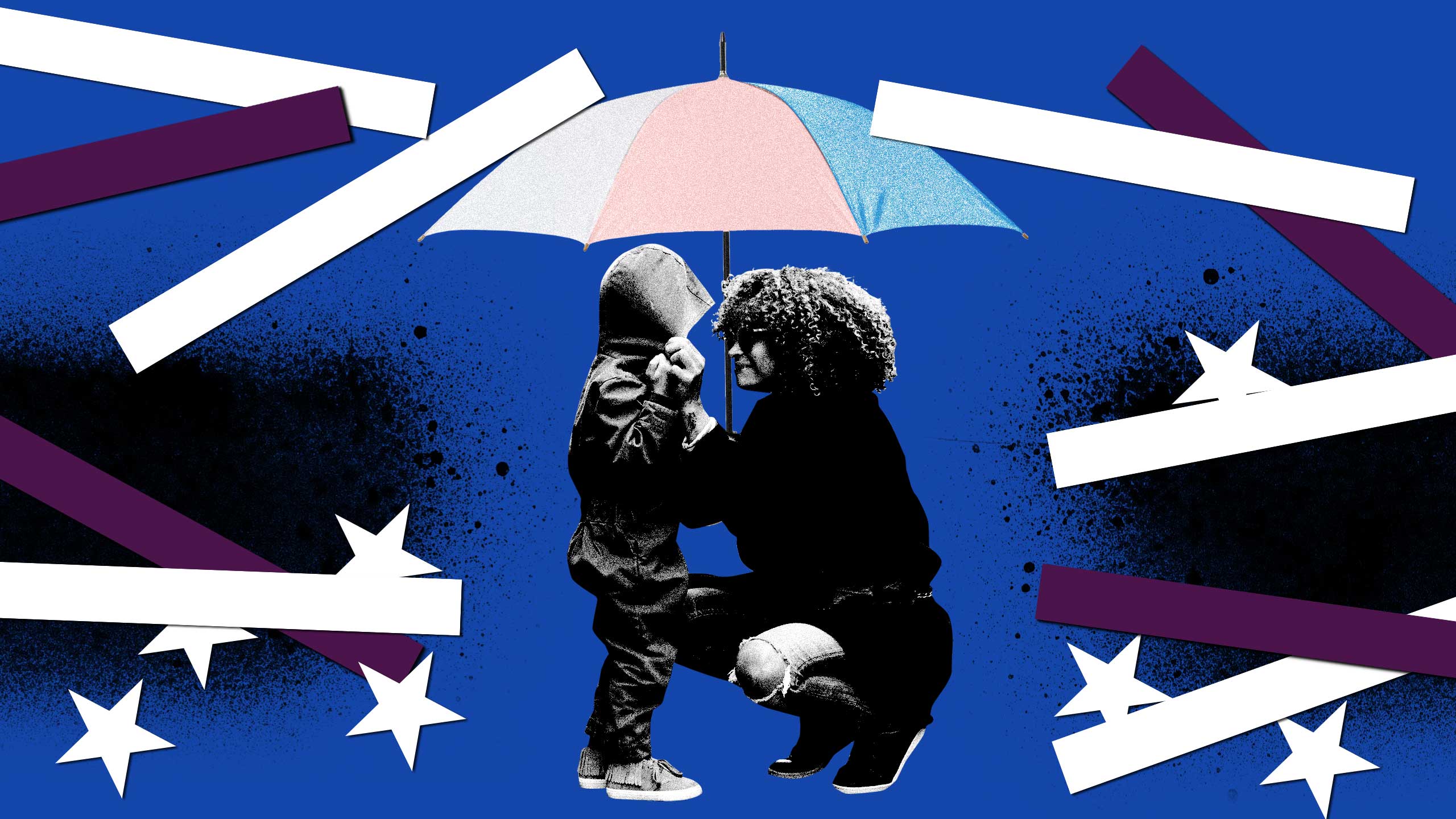It has rarely sucked more to be a parent than it does right now. COVID-19 has shut down schools and daycares; the recession has pushed millions of people out of the workforce. All of this is hard enough without the feeling that your government opposes your child’s right to exist or live to adulthood. But that’s precisely what the parents of trans kids in the United States are facing right now.
It’s hard to describe the current slate of anti-trans legislation without using the word “onslaught”: At least 50 bills in at least 34 states (which are being introduced and passed through state legislatures so rapidly it’s hard to give an accurate count)—all of them aimed at children, many of them brutally punitive. Aside from the famous Arkansas law making it a felony to provide gender-affirming care to minors, there is the Texas bill to remove trans children from affirming homes, the North Carolina bill requiring state employees to report “gender nonconformity” to parents and a second Arkansas bill that requires schools to deadname students. Given the rapidity with which these bills are being introduced, living in a “safe,” supposedly trans-friendly state doesn’t necessarily guarantee safety in the future—and, in some families, both parents and children are being rendered unsafe.
Most stories about trans children tend to presume their parents are cis people; whether they’re affirming or abusive, the way cis adults react to trans children is always at the heart of the story. But trans people are parents, too, and when they have trans children, they’re put in the nightmarish position of watching their kids re-experience their own formative traumas.
Jason, a trans man living in Michigan, is part of an all-trans family. His spouse, Drew, is non-binary, and their trans daughter has been clear about her gender identity since she was a toddler. “By the time she was two she was doing this thing where she would just burst into tears when someone would ask if she was a boy or a girl,” Jason says. By three and a half, she could answer the question: “She was like, ‘Oh my God, I’m a girl, of course I’m a girl.’ To her it was super obvious and she was extremely annoyed that no one had noticed.”
“Trans parents are put in the nightmarish position of watching their kids re-experience their own formative traumas.”
Michigan is one of the states that has introduced anti-trans legislation this year. The bill, which bans trans athletes from playing on the high school teams that best correspond with their gender identity, wouldn’t immediately affect Jason’s daughter, who’s only five years old. But he’s already thinking about how to shield his daughter from the fact that some people hate her because of her gender identity.
“We’ll say, like, ‘Some people believe that you have to be whatever gender the doctors said you were when you were born, but we know it’s not really like that,’” he says. “I’m not going to tell a sensitive five-year-old, ‘Hey, did you know there are bigots who want to make it against the law for you to play soccer?’” His daughter has already had brushes with transphobia, like neighbours who insistently misgendered her, and those were traumatic enough. “It was bad. She started peeing her pants constantly, she stopped sleeping,” Jason says. “So she doesn’t need to carry that stress right now.”
With older kids, it’s much harder to keep the world at bay. Morgan is the parent to 13-year-old Charlie; both parent and child are non-binary, and though they live in the relatively safe state of New York, they know families that have been affected by anti-trans laws elsewhere. Morgan’s home state of Florida, for one, recently passed a ban on trans student athletes playing on teams that align with their gender identities, though activist pressure convinced them to strike the clause mandating “genital exams” on nonconforming athletes. Charlie is old enough to use the internet, so there’s no protecting them from information.
“Charlie spends a lot of time on Discord [an invite-only chat platform],” Morgan says. “And sometimes the other kids they talk with are thinking out loud about suicide. That is very troubling for them to read, and every time one of these bills advances I think that increases the probability. I had to tell them recently, ‘As an LGBTQ person, you will be very fortunate if you get through life without any of your close friends trying to hurt themselves. It is not your fault, and it’s not their fault.’ It was a very difficult conversation to have with my child.”
Those tough conversations are substantially tougher when you’re dealing with dysphoria and stress of your own. Jason and Drew have developed a rule that neither one of them has to talk about the news if they can’t handle it. Morgan began transitioning only in the past year, after a layoff and a COVID-19 scare; now, the euphoria of starting estradiol (“my brain lit up”) is weighed down by hypervigilance and doomscrolling. “My wife is not very online, and I am extremely online,” Morgan tells me. “Sometimes, by the time she finishes work, I am fuming.”
“Kids deserve to have safety outside of their own family kitchens and living rooms.”
There’s also the knowledge that things could get worse. In Arkansas, trans teenagers are attempting suicide in alarming numbers since the anti-trans bills were passed there, and parents are fleeing the state to secure health care for their children. Jason’s daughter is too young to need gender-affirming treatment yet, but he’s already planning for what happens if she can’t get it in Michigan.
“If we can’t get [puberty] blockers here, we’re gone, no question,” Jason says. “And I don’t say that flippantly. We are below the poverty line… If we have to leave, it will in many ways ruin our lives.”
Better a ruined life than a dead kid. But it’s not a choice anyone should have to make—least of all parents who are already disproportionately likely to be dealing with poverty and discrimination. Some families, especially those in dire straits, will likely be stuck where they are. Americans have a habit of invoking Canada whenever things get bad, and the idea of fleeing north comes up often in these conversations—but Canada has its own conservatives and TERFs to contend with. The idea of finding permanent safety elsewhere is an illusion, and the only real answer is to stand and fight where we are.
This is a dire situation. Thankfully, these particular trans children have—which too many trans children lack—an example of resilience, and adults in their lives who understand what they’re going through. None of them will have to be alone; none of them will grow up believing themselves to be impossible. There will always be a safe place in their lives where they can be themselves.
But kids deserve to have safety outside of their own family kitchens and living rooms. They deserve schools and doctors and governments that respect them as much as their parents do. It’s up to adults to expand that zone of safety, beyond the bounds of family, until it covers the world.
All names in this story have been changed to protect the families’ privacy and safety.


 Why you can trust Xtra
Why you can trust Xtra


